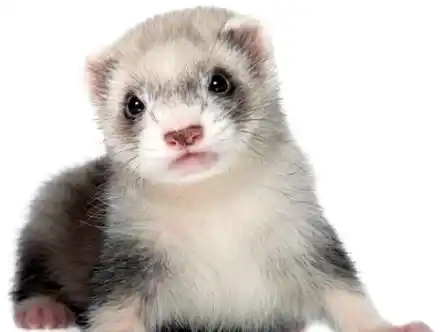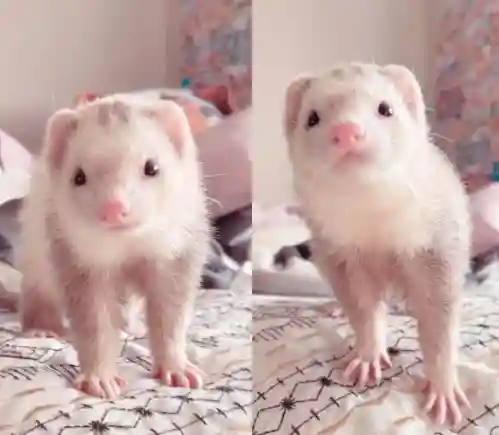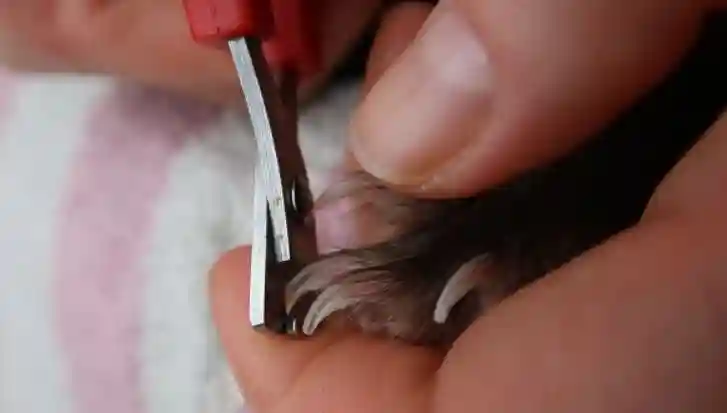Hello Everybody! In this article, we will discuss a different topic, ‘Ferrets’, and also try to uncover the secret question, ‘How long do ferrets live?‘ Ferrets are delightful creatures that have captured the hearts of many pet enthusiasts around the world. It’s a good idea to spend time with ferrets before bringing one home, especially if you have pet allergies.
In this article, we will delve deep into the world of ferrets, covering various aspects such as their history, behavior, care, and more. So, if you’re considering adopting one or simply want to learn more about these furry friends, read on!
A Closer Look of Ferrets

Ferrets, scientifically known as Mustela putorius furo, belong to the Mustelidae family, which also includes weasels and otters. These domesticated animals have been human companions for thousands of years. Originally bred for hunting rodents, they have now become beloved pets.
Ferret History
Ferrets have a rich history dating back to ancient civilizations. The Egyptians initially domesticated them and the Romans later introduced them to Europe. These small mammals were highly valued for their exceptional hunting abilities, particularly in controlling rat populations. Over time, ferrets transitioned from hunters to household companions, charming their way into our homes.
Ferret Anatomy

Ferrets are small creatures, measuring about 16 inches in length, including their tail. They have sleek, elongated bodies, short legs, and a playful demeanor. Their fur comes in a variety of colors, including sable, albino, and cinnamon, making each ferret unique.
Ferret Characteristics Overview
| Characteristic | Description |
|---|---|
| Species | Mustela putorius furo (domestic ferret) |
| Size | Small, typically 13–16 inches (33–40 cm) long |
| Weight | 1 to 4 pounds (0.45 to 1.8 kg) |
| Lifespan | 6 to 10 years or more in captivity |
| Habitat | Domesticated, originally from European polecat |
| Coat | Short, dense fur, various colors and patterns |
| Behavior | Playful, curious, social, and highly active |
| Diet | Carnivorous, primarily eat meat-based diets |
| Domestication | Domesticated for hunting and as pets |
| Reproduction | Give birth to kits, typically 3–7 per litter |
| Lifespan | Typically 6-10 years in captivity |
| Health Concerns | Susceptible to certain diseases and parasites |
| Legal Status | It is legal to keep as pets in many countries |
Types of Ferrets
Ferrets come in a variety of colors and patterns, but they are all part of the same domesticated species, Mustela putorius furo. Some of the common types or color variations of ferrets include:
- Sable Ferrets: These are the most common and recognizable types of ferrets. They have a rich, warm brown coat with a creamy underbelly and a black mask.
- Albino Ferrets: Albino ferrets have a pure white coat, pink eyes, and a pink nose. They lack pigmentation, which gives them their distinctive appearance.
- Silver Ferrets: Silver ferrets have a silver-gray coat with a white or cream underbelly. Their fur can appear quite sleek and shiny.
- Cinnamon Ferrets: Cinnamon ferrets have a warm, reddish-brown coat. They are similar in color to sable ferrets but have a slightly different shade.
- Champagne Ferrets: Champagne ferrets have a light, champagne-colored coat with a pink nose. They are lighter in color compared to sable ferrets.
- Dark-Eyed White (DEW) Ferrets: DEW ferrets have a white coat with dark, almost black eyes. They are similar to albino ferrets but have darker eyes.
- Panda Ferrets: Panda ferrets have a predominantly white coat with black markings on their back, creating a panda-like appearance.
- Blaze Ferrets: Blaze ferrets have a distinctive white stripe, or “blaze” running down their faces, contrasting with their darker coat color.
- Lilac Ferrets: Lilac ferrets have a pale, lavender-gray coat. They are less common than other color variations.
- Copper Ferrets: Copper ferrets have a deep, coppery-red coat with a white or cream underbelly.
The Ferret Experience
Playful Personalities: One of the most endearing qualities of ferrets is their playfulness. They are renowned for their boundless energy and curious nature. Ferrets love to explore their surroundings, investigate every nook and cranny, and engage in games that will keep you entertained for hours.
Social Creatures: Ferrets are highly social animals that thrive on interaction. They form strong bonds with their human companions and other ferrets. Keeping them in pairs or small groups is recommended to prevent loneliness and boredom.
Communication: Ferrets communicate through a variety of sounds, including chirping, hissing, and dooking (a happy, excited vocalization). Understanding these sounds will help you decipher your ferret’s moods and needs.
Lifespan of ferrets. How long do ferrets live?
Ferrets typically live for about 6 to 10 years on average, although some can live longer with proper care and a healthy lifestyle. Regular veterinary check-ups and a balanced diet play important roles in ensuring the longevity of these charming pets.
Ferrets Housing
When it comes to housing your ferret, a spacious cage is essential. Ferrets need room to move and play. Ensure that the cage has multiple levels, ramps, and cozy hiding spots. Don’t forget to provide plenty of toys to keep them mentally and physically stimulated.
- Indoor Enclosure: Ferrets are typically housed indoors due to their small size and susceptibility to extreme temperatures.
- Ferret Cage: A large, multi-level ferret cage is recommended. Look for one with horizontal bars to allow climbing and exploration.
- Space Requirements: Provide at least 2–3 square feet of cage space per ferret. More space is better for their active nature.
- Multiple Levels: Ferrets enjoy climbing and exploring, so a multi-level cage with ramps, tunnels, and hammocks is ideal.
- Safety: Ensure there are no gaps or spaces where ferrets can escape or get stuck. Ferret-proof the cage.
- Litter Box: Place a litter box in one corner of the cage. Ferrets are naturally inclined to use a specific area for waste.
- Bedding: Use bedding material like fleece or towels for comfort and easy cleaning. Avoid materials they might chew on, like cedar or pine shavings.
- Toys and Enrichment: Provide toys and items for mental and physical stimulation. Toys can include tunnels, balls, and puzzle feeders.
- Hideouts: Ferrets appreciate small, enclosed spaces where they can rest. Include hideouts or sleep sacks.
- Social Animals: Ferrets are social animals, so consider having more than one ferret for companionship. Ensure the cage is spacious enough for multiple ferrets.
- Daily Playtime: Allow for supervised playtime outside the cage each day in a ferret-proofed room.
- Temperature Control: Keep the room temperature between 60-70°F (15-24°C) as ferrets are sensitive to heat.
- Ventilation: Ensure good ventilation to prevent the buildup of odors and maintain a healthy environment.
- Cleaning: Clean the cage and litter box regularly to prevent odors and maintain hygiene.
- Ferret-Proofing: Ferret-proof the room where they play to prevent access to hazards like electrical cords and small objects they could ingest.
- Safety Concerns: Be cautious with other pets like dogs and cats, as ferrets can be seen as prey or rivals. Supervise interactions.
- Regular Checkups: Schedule regular veterinary checkups to monitor their health.
Providing a safe, comfortable, and enriching environment is essential for the well-being of pet ferrets.
Ferret Diet
Ferrets are obligate carnivores, meaning their diet should consist mainly of meat. A high-quality ferret kibble or a balanced raw diet is recommended. Avoid feeding them fruits, vegetables, or dairy products, as these can upset their digestive system.
- Carnivorous: Ferrets are obligate carnivores, meaning they require a diet primarily composed of animal-based protein.
- High Protein Content: Their diet should consist of at least 32-40% protein, preferably from meat sources.
- Animal Protein Sources: Common protein sources include poultry (chicken, turkey), beef, lamb, and organ meats (liver, heart).
- Limited Carbohydrates: Ferrets have a short digestive tract and cannot efficiently process carbohydrates. Commercial ferret food should have minimal carbohydrates.
- Fat: They require moderate amounts of healthy fats for energy and coat health.
- Taurine: An essential amino acid, taurine, should be present in their diet. It’s commonly found in meat.
- Fresh Water: Access to clean, fresh water is crucial for their hydration.
- Avoid Sugary Foods: Ferrets should not consume sugary treats or foods, as it can lead to health issues.
- Commercial Ferret Food: High-quality commercial ferret kibble is available, which meets their nutritional requirements.
- Raw or cooked meat: Some owners supplement their diet with raw or cooked meats, but it should be done with caution to ensure a balanced diet.
- Avoid Dog/Cat Food: Ferrets have specific dietary needs, and dog or cat food doesn’t provide the necessary nutrients.
- Portion Control: Be mindful of portion sizes to prevent obesity. Feed according to age, weight, and activity level.
- Consult a Veterinarian: It’s essential to consult a veterinarian who is knowledgeable about ferret care to create a balanced diet plan.
Grooming of Ferrets

Ferrets are relatively low-maintenance in terms of grooming. Regular baths and cleaning their bedding can manage their natural musky odor. Additionally, trimming their nails and brushing their coat occasionally is essential. Here are some grooming considerations for ferrets:
1. Bathing:
- Ferrets have natural oils on their skin, so they don’t need frequent baths.
- Only bathe them if they get into something dirty or smelly.
- Use a ferret-specific shampoo and lukewarm water.
- Gently lather and rinse thoroughly.
- Pat them dry with a towel, as their skin is sensitive.
2. Brushing:
- Ferrets have a short, dense coat that requires minimal brushing.
- Use a soft-bristle brush or a grooming mitt to remove loose hair and stimulate circulation.
- Brush them once a week to keep their coat in good condition.
3. Nail Trimming:
- Ferrets have sharp claws that can scratch both them and their owners.
- Trim their nails every 2–4 weeks using a small animal nail clipper.
- Be cautious not to cut too close to the quick, which can cause bleeding.
4. Ear Cleaning:
- Check their ears regularly for wax buildup, dirt, or signs of infection.
- Use a damp cotton ball or a pet ear cleaner recommended by your vet.
- Gently clean the outer ear without inserting anything into the ear canal.
5. Dental Care:
- Dental hygiene is important to prevent dental problems.
- Provide chew toys and dental treats to help reduce tartar buildup.
- Consult your vet for advice on maintaining their dental health.
6. Anal Gland Expression:
- Some ferrets may require anal gland expression if they have issues with impacted glands.
- A veterinarian or an experienced groomer should do this.
7. Eye Care:
- Keep an eye out for any discharge or signs of eye irritation.
- If necessary, wipe their eyes with a damp, clean cloth.
8. Hygiene Products:
- Use ferret-specific grooming products to ensure they are safe for your pet.
- Avoid using products meant for other animals.
9. Vet Checkups:
- Regular veterinary checkups are essential to monitor your ferret’s overall health, including their skin and coat.
10. Handling and Bonding:
- While grooming, use gentle and positive reinforcement techniques to build trust and strengthen your bond with your ferret.
Do ferrets smell?
Ferrets can have a distinct odor, but it’s important to understand the factors contributing to this smell and how to manage it.
- Natural Scent Glands: Ferrets have scent glands that produce a musky odor. This scent is a natural part of their biology and is used for communication and marking territory.
- Diet: A ferret’s diet can influence their odor. Low-quality or inappropriate diets may lead to stronger-smelling feces and urine.
- Litter Box Maintenance: Keeping their litter box clean and changing it regularly can help control the odors associated with waste.
- Bathing: While ferrets should not be over-bathed, occasional baths with a ferret-specific shampoo can help reduce their natural musky odor. However, over-bathing can strip their skin of natural oils and make the scent worse.
- Neutering/Spaying: Neutered or spayed ferrets tend to have a milder scent compared to intact ones.
- Environmental Factors: Proper ventilation and maintaining a clean living space can help reduce overall odors in the ferret’s environment.
- Air Purification: Using air purifiers in the room where the ferret lives can help mitigate odors.
Conclusion
Ferrets are remarkable pets that offer endless joy and companionship. Their unique personalities and playful antics make them a delightful addition to any household. But owning a ferret means taking on responsibilities, like giving them the right care and attention. If you understand how they behave, create a safe space, and show them love and care, you can have a rewarding and enjoyable experience with your ferret.
Frequently Asked Questions (FAQs)
Are ferrets good pets for families?
Yes, ferrets can be excellent family pets, especially if you have children. They are generally friendly and enjoy playing with kids. However, it’s crucial to supervise interactions to ensure the safety of both the ferret and the child.
Do ferrets get along with other pets?
Ferrets can get along with other pets, but introductions should be gradual and supervised. They may have a strong prey drive, which can lead to conflicts with smaller animals like birds or rodents.
How long do ferrets live?
On average, ferrets live for about 6 to 10 years, although some can live longer with proper care. Regular veterinary check-ups and a healthy diet can contribute to their longevity.
What is ferret-proofing?
Ferret-proofing your home is essential to keeping these curious creatures safe. This involves securing cabinets, blocking small spaces, and removing any items that may be harmful if chewed or ingested.
Are ferrets legal pets everywhere?
Ferret ownership laws vary by location. It’s crucial to check your local regulations and obtain any required permits or licenses before bringing a ferret home.
Do ferrets require vaccinations?
Yes, ferrets should receive vaccinations against certain diseases, such as canine distemper and rabies. Consult your veterinarian for a vaccination schedule.






